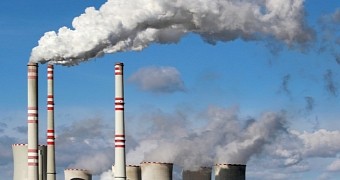A series of papers and a report made public by the Global Carbon Project this past September 21 argue that, according to data at hand, global carbon dioxide emissions will hit a record 40 billion tonnes in 2014.
What's more, members of this green-oriented organization maintain that, unless fossil fuel consumption is limited to a considerable extent, the world will fail to keep global warming under 2 degrees Celsius (3.6 degrees Fahrenheit).
Global CO2 emissions over the years
Scientists with the Global Carbon Project say that, having analyzed the ecological footprint of various industries, they found fossil fuel combustion and cement production to be the top carbon dioxide emitters on a global scale.
Specifically, the researchers say that, taken together, fossil fuel consumption and cement production translated into a 2.3% increase in carbon dioxide emissions in 2013. Thus, overall emissions of this potent greenhouse gas amounted to 36.1 billion tonnes.
It is expected that, by the end of this year, global carbon emissions will grow another 2.5%. The resulting 40 billion tonnes will represent an increase of 65% over the emissions documented on a global scale in 1990.
Who is to blame for this increase?
In their report, the Global Carbon Project researchers point the finger at China, the US, the EU and India as the world's largest carbon dioxide emitters. Specifically, they argue that these countries are responsible for 58% of overall emissions.
China, the US and India experienced a 4.2%, 2.9% and 5.1% increase in greenhouse gas emissions in 2013, respectively. The EU might have reported a 1.8% drop in carbon dioxide emissions, but this only happened because member states export emissions by importing goods and services.
“China now emits more than the US and EU combined and has CO2 emissions per person 45% higher than the global average, exceeding even the EU average,” researcher Robbie Andrew said in a statement, as cited by the Alpha Galileo Foundation.
“China continues to reshape the global distribution of emissions, and as politics impedes significant progress in the US and other key countries, observers increasingly look to China to provide a breakthrough in climate negotiations,” added specialist Glen Peters.
Time is running out to limit global warming
In order to limit global warming to under 2 degrees Celsius (3.6 degrees Fahrenheit) when compared to the pre-industrial era, efforts must be made to limit overall future carbon dioxide emissions to 1,200 billion tonnes. Even so, there is only a 66% chance that global warming will not move forward.
The problem is that, judging by these latest Global Carbon Project data, it's possible that the world will use up its remaining so-called carbon dioxide emissions quota in about 30 years. This means that, in about one generation's time, the 2 degrees Celsius (3.6 degrees Fahrenheit) limit will likely be breached.
“If we carry on at the current rate we will reach our limit in as little as 30 years' time - and that is without any continued growth in emission levels. The implication of no immediate action is worryingly clear – either we take a collective responsibility to make a difference, and soon, or it will be too late,” said Pierre Friedlingstein, as cited by EurekAlert.
“We need substantial and sustained reductions in CO2 emissions from burning fossil fuels if we are to limit global climate change. We are nowhere near the commitments necessary to stay below 2°C of climate change, a level that will be already challenging to manage for most countries around the world, even for rich nations,” added Corinne Le Quéré.
It is believed that, in order to limit global warming, emissions must drop at a rate of over 5% per year for several decades to come. Besides, about 50% of the world's documented fossil fuel reserves should remain in the underground and not be burned.
This latest report on global carbon dioxide emissions and their influence on our planet's climate was released just in time for the United Nations Climate Summit scheduled to take place in New York, US, this coming September 23.

 14 DAY TRIAL //
14 DAY TRIAL //